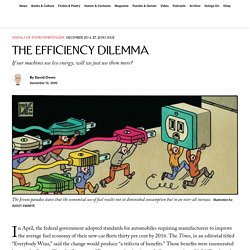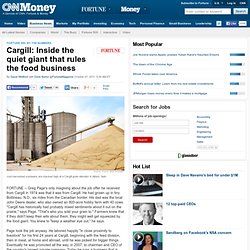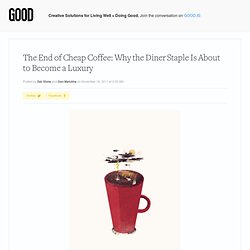

Incognito. The Jevons Paradox and curbing energy consumption. In April, the federal government adopted standards for automobiles requiring manufacturers to improve the average fuel economy of their new-car fleets thirty per cent by 2016.

The Times, in an editorial titled “Everybody Wins,” said the change would produce “a trifecta of benefits.” Those benefits were enumerated last year by Steven Chu, the Secretary of Energy: a reduction in total oil consumption of 1.8 billion barrels; the elimination of nine hundred and fifty million metric tons of greenhouse-gas emissions; and savings, for the average American driver, of three thousand dollars. Chu, who shared the Nobel Prize in Physics in 1997, has been an evangelist for energy efficiency, and not just for vehicles. I spoke with him in July, shortly after he had conducted an international conference called the Clean Energy Ministerial, at which efficiency was among the main topics. “I feel very passionate about this,” he told me.
But the issue may be less straightforward than it seems. Corrected: Commodity Traders: The trillion dollar club. Cargill: Inside the quiet giant that rules the food business - Oct. 27. Just-harvested soybeans are stacked high at a Cargill grain elevator in Albion, Neb.

FORTUNE -- Greg Page's only misgiving about the job offer he received from Cargill in 1974 was that it was from Cargill. He had grown up in tiny Bottineau, N.D., six miles from the Canadian border. His dad was the local John Deere dealer, who also owned an 800-acre hobby farm with 40 cows. "Cargill has historically had probably mixed sentiments about it out on the prairie," says Page. "That's who you sold your grain to. " Page took the job anyway. With $119.5 billion in revenues in its most recent fiscal year, ended May 31, Cargill is bigger by half than its nearest publicly held rival in the food production industry, Archer Daniels Midland (ADM, Fortune 500). But those numbers alone don't begin to capture the scope of Cargill's impact on our daily lives.
Despite Cargill's extraordinary size, strength, and breadth, it has long been remarkably successful at keeping out of the public eye. No slowing down. The End of Cheap Coffee: Why the Diner Staple Is About to Become a Luxury - Lifestyle. On a rainy Wednesday afternoon in Venice, California, Dan Kougan spreads out three shot glasses in front of a curious audience.

The champagne-colored liquid bubbling on the left is a homemade hops soda. The creamy, tan shot in the middle is a barley-chocolate malt topped with a tuft of steamed milk. And the chestnut-hued beverage on the right, the raison d’être of this whole ordeal, gives off the unmistakable scent of fresh espresso, extracted from the highest-quality coffee beans the developing world has to offer. “Thanks, Dan, I’m really excited!” Says Elaine Levia. Of course he does. Sip from lightest to darkest, instructs Kougan. Levia complies. The idea of the Slow Bar is to “give the customer an experience that expands their idea of what coffee is,” says Charles Babinski, who trains the staff in different brewing techniques and hosts educational events for customers.
A luxury drink, that is. Mother Nature might be on the side of Giuliano and his cohorts. The result?